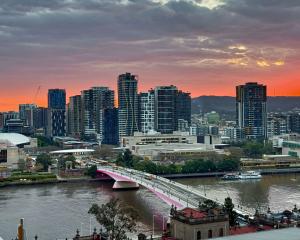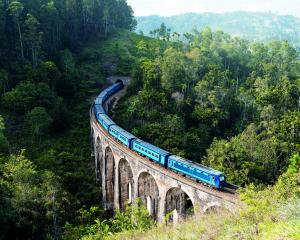Reality intervened and we had to organise our adventure on a smaller scale. Kidney failure meant the first priority was to organise dialysis three times a week and to base ourselves in Darwin, the capital of the Northern Territory, or the Top End as it's commonly known.
We went in June, the Dry, when the sun beams from a cloudless sky every day, the temperature hovers between 29degC and 31degC and the sunsets, at about 6.30pm each evening, are the most spectacular I've seen.
Darwin's population of about 130,000 is little more than Dunedin but it seems so much busier and bigger in the Dry as Australians from the south and overseas tourists converge for their fix of winter sunshine.
It's expensive in the Top End in the Dry. Combine the tourist season with the weakness of the New Zealand dollar against the Australian and it could be easy to let penny-pinching spoil your holiday.
But life moves at a languid pace in the Top End. No one, European or Aboriginal, seems in a hurry and soon money worries, or any sort of worries, are forgotten amid the state of induced torpor.
The Rough Guide to Australia describes the Territory as attracting people who want to escape their past, where people ask few questions, where most people were born elsewhere and where the "character" is in his element, propping up bars and bolstering the myths of the region's frontier history.
Certainly, it's different. Both sophisticated and rough.
Salt-of-the-earth people and those who couldn't care less. An attractive, modern city, rebuilt after Cyclone Tracy in 1974 but still with an element of the outback about it. And why not?
It's thousands of kilometres from the next big city.
Among the gleaming, modern cars are those covered in red dust from long-distance driving from places like Katherine, Tennant Creek and Alice Springs. And the houses are invariably surrounded by high fences, many with guard dogs.
Crime is obviously a problem around here.
The patients at the Northcliff Renal Unit are mainly Aboriginal. They make up 28% of the Territory population.
Most dialyse in Darwin and, when they have learned the process and their machines, they return to their settlements and dialyse at home.
Health is a major problem for the Aboriginal population, with 45% of men and 34% of women dying before the age of 47 and 71% before the age of 65. These are shocking and sobering statistics, brought on by poor nutrition, alcohol and drug abuse.
I don't try to force conversation on my fellow patients. They are content mainly with their own company.
But some loosen up during our two and a-half weeks at the unit and Billy, who dialyses in the chair next to me, is a man of humour and quiet dignity. He lives at a settlement 800km away. That's not unusual.
Distance is nothing in this vast continent.
The abiding memory for me will be of the Aboriginal patients sitting in the shade of the trees outside the hospital waiting for their treatment.
They're not in a hurry. There's nothing to rush for. It's the same wherever the Aboriginals congregate.
Our accommodation is a budget motel that costs $A140 a night. Budget in name and nature. It's a few hundred metres from the old Darwin jail in the suburb of Fannie Bay. Liz and I joke that it's easy to confuse the motel and the jail.
There's even a mean-looking dog, hardly an attraction for children. But we spend as little time there as possible and the advantage is that it's in a good location.
It is about a kilometre walk from the Mindil Beach sunset markets, which are on every Thursday and Sunday. Locals unpack their eskies and garden furniture and settle in for the sunsets while children frolic on the sand (but not in the sea as most beaches carry crocodile warnings).
There is an astonishing array of about 40 food stalls selling everything from Aussie bush tucker to Indian.
For example, I ate mudcrabs, lamb shanks and barramundi while Liz had satay prawns and Thai beef noodles.
We spent an enlightening few hours at the Darwin Military Museum, which highlighted just how much the area was affected during World War 2. Darwin was bombed 64 times by the Japanese over two years and the first of two raids on February 19, 1942 caused the deaths of 243 people.
Others believe the figures were watered down by the officials, so as not to cause panic throughout Australia, and that the actual number killed was closer to 1000.
The choice of eating places in Darwin seems endless but, after some experimentation, our favourite was the Darwin Trailer Boat Club, a few hundred metres up the road from our motel.
Visitors are able to sign themselves in as guests, watch the sun go down with a wine or ice-cold beer and then dine on food which is plentiful, well-cooked and presented and, by Darwin standards, reasonably priced. The steaks were magnificent - thick, juicy and tender, and there was a wide choice of salads. The locals gather there after work and there is a lovely family atmosphere.
We decided not to hire a car for our 17-day stay in the Northern Territory and instead we each bought a bus ticket for $A15 a week, which took us anywhere in and around Darwin. And it was no hardship to walk with the warm sun on our backs and new sights to savour.
Our decision was based on spending seven hours at the dialysis unit three days a week, when the car would be standing idle, but we would recommend a hire car to others to make maximum use of the time available.
The hotels on the Esplanade are modern, sterile and expensive. All cost more than $A200 a night but, during the Wet, when the tourists stay away and others try to escape the humidity, prices drop by as much as 50%.
A visit to the crocodile farm is a must for visitors to Darwin.
The crocodiles were quite lethargic on the day of our visit.
Apparently, they are more lively in the Wet. But there was a wide variety of other animals including lions, tigers, baboons, snakes and wallabies.
We formed the impression Darwin is still a city in search of its identity.
It is not a tourist destination as such but it is on the way to becoming one and its proximity to Asia is a major advantage.
Its climate in the Dry and its natural beauty are obvious attractions.
In the first week we were there the temperature plunged to 25degC and the local newspaper, the Northern Territory News, carried stories of a rush on heaters at appliance stores during the Big Chill!Darwin is not like Sydney, Melbourne, Brisbane, Adelaide or Perth.
It is distinctively different, still with some elements of a frontier town.
It is a whole new experience and it is one, despite the occasional letdowns, that we would not have missed.












